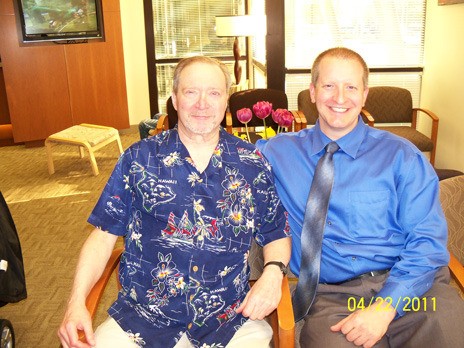Arthur Heide is a 62-year-old disabled Vietnam veteran. On April 26, 2010, Mr. Heide was working on repairing his laptop, something he has done many times in the past. This time he was having problems with getting the last screw in the slot. He started to feel angry because he just couldn’t get the part screwed together.
He remembers feeling very tired, but it was nearly 9:30 in the evening and he usually feels tired by this time of the evening. Still, something was not right. He next noticed that the left side of his face felt numb. His vision in his left eye went purple. He had flashes of pain in his head and eye. That’s when he knew he was having a stroke.
He struggled out of his study and managed to say the words “911 stroke” to his wife Dianne. She immediately called 911. Then she called her stepson, Dr. Aaron Heide. Aaron Heide is the neurologist at Auburn Regional Medical Center. He is known as the stroke doc.
By time the aid crew arrived at the Arthur Heide’s home, he could not move. In his words he “was locked in his body.” He remembers being conscious and could understand what was going on around him, but he could do nothing.
In the emergency room at Auburn Regional Medical Center a scan of Arthur’s brain showed that he had suffered a severe stroke. He was diagnosed and treated in the emergency department by his son via telemedicine. A monitor and camera were wheeled up to Arthur’s bed so that Aaron could speak to and watch his father’s responses and monitor his vital signs.
Aaron asked his dad to raise his left arm, but he raised his right arm instead. His father was about to lose the use of his entire left side, possibly forever. It was a challenge, Aaron said, to keep control of his emotions. He could not vary from the known standard of care. During the process of assessing his father’s condition, tissue plasminogen activator (tPA) was being prepared, vital signs were being monitored, but all the emotions and fear had to wait until his dad was admitted to the intensive care ward.
Arthur was treated with a drug called tPA, a thrombolytic agent (clot-busting drug) that is effective in treating ischemic stroke. This kind of stroke is caused by blood clots that block blood flow to the brain. TPA can significantly reduce the effects of stroke and reduce permanent disability if it is given to a person within the first three and one half to four and one half hours after the stoke symptoms first appear. By 11 p.m. Arthur was able to talk. By the following Thursday, four days later, Arthur went home.
Over time he has completely recovered from a stroke that could have locked him in his body until he died. In the words of Aaron Heide, “you don’t die from a stroke.” You go to a nursing home where you stay until something else kills you, it could be pneumonia, a heart attack or some kind of infection.
Had Arthur ignored his symptoms and gone to bed, he would not have recovered from his stroke. His advice is “everyone knows when something is not right but they ignore or override it. Tell somebody, call 911.”
Call 911 is exactly what I did on Easter while visiting my dad. I was in the kitchen cooking dinner, chatting with my dad. I noticed he was slurring his words. Then my dad said “I think I’m slurring my words.” I walked into the family room and I said, “I think you are too, and the left side of your face is sagging.”
So I gave him the F.A.S.T. test. F for Face, ask them to smile. Is their face lopsided? A, for Arms, ask them to raise both arms. Does one arm rise faster and higher than the other? S for Speech, ask them to say “firefighters are my friends”. Can they say it correctly? T is for Time. Time when symptoms were first noticed and if present it is time to call 911.
Now I have done the F.A.S.T test with my dad twice before in the past six months, both times he passed. This time he failed.
Luckily my dad’s stroke was a TIA (transient ischemic attack). It’s a type of stroke that is very short term and does no known damage. Still he took an ambulance ride to the hospital and spent most of the next day being tested for future stroke possibilities. Any time you think someone is having a stroke, think F.A.S.T and call 911.
Merrili Owens is the executive director of the Central Region EMS and Trauma Care Council.
May is National Stroke Awareness month. The National Stroke Association sends the message that it is important to understand stroke symptoms and response. Time is a very urgent factor when it comes to stroke. Emergency treatment may be available if a stroke is recognized fast and 911 is called. The faster a person having a stroke is taken to the hospital, the better chance of them receiving emergency treatment.
Talk to us
Please share your story tips by emailing editor@kentreporter.com.
To share your opinion for publication, submit a letter through our website https://www.kentreporter.com/submit-letter/. Include your name, address and daytime phone number. (We’ll only publish your name and hometown.) Please keep letters to 300 words or less.

